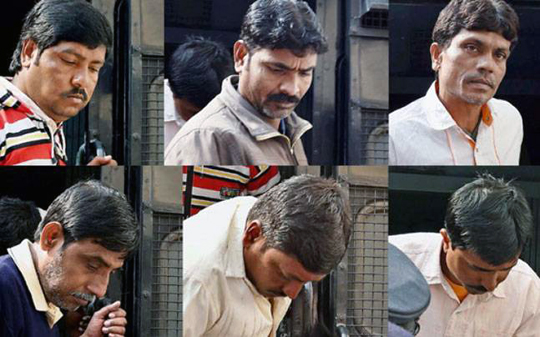Kolkata, Jan 30: Three convicts of the sensational Kamduni gangrape and murder of a 21-year-old college student over two years back were today sentenced to death by a city court while three others got life imprisonment.

Additional Sessions Judge Sanchita Sarkar handed out capital sentence to Aminul Ali, Saiful Ali and Ansar Ali, while Imanul Islam, Aminul Islam and Bhola Naskar were sentenced to life imprisonment for the gangrape and brutal murder of the woman on June 7, 2013.
Rejecting arguments for not giving death sentence to the three, who were found guilty of gangrape and murder, by their lawyers claiming it could not be termed as the rarest of rare crime, the judge pronounced the sentences at 3.40 pm.
The judge called out the names of each of the convicts, who were produced in the packed court room, before pronouncing the sentences.
Saiful Ali, Ansar Ali and Aminul Ali were found guilty under sections 376(d) (gangrape), 302 (murder), 376A (inflicting injury which causes death of a woman) and 120B (criminal conspiracy) of IPC.
The judge found the other three guilty under sections 376(d) (gangrape), 120B (criminal conspiracy) and 201 (causing disappearance of evidence) of IPC.
Two accused -- Rafiqul Islam and Nur Ali were acquitted on Thursday owing to lack of evidence against them. Another accused Gopal Naskar died during trial in August last year.
The gangrape and murder of the girl took place when she was returning home at Kamduni, about 50 km from Kolkata, in North 24-Parganas district after appearing for an examination at her college on June 7, 2013.
The second year BA student was pulled into a farm when she was walking back home along a deserted road after alighting from a bus. She was subsequently gangraped and murdered.
Her mutilated body was found the next morning in a corner of the farm.
The incident had sparked widespread outrage in the state amidst serious concerns over women's safety.
Judge Sarkar pronounced the verdict after hearing the arguments of defence counsel Firoze Edulji and T Ghosh against handing out of death sentence to the three convicts.
Claiming that there had been more heinous crimes in which convicts had been spared the death sentence by different courts, including the Supreme Court, Edulji submitted that they be given long jail terms.
Appearing for the prosecution, counsel Dipak Ghosh said the circumstances in which the victim died and the nature of injuries to her private parts that led to tearing up of her legs be considered while handing out the sentence.
He stated that the convicts had shown no repentance for the crime, while pleading for the death penalty.
"Annihilation is what they deserve," Ghosh submitted.
The judge talked to all the six convicts, each of whom claimed that they were innocent and had been framed.
Trial in the case had been transferred to City Sessions Court here from Barasat Sessions Court after the counsel for one of the accused moved Calcutta High Court claiming that protesters were preventing him from representing his client.
The hearing in the case was concluded on December 18.





Comments
Add new comment